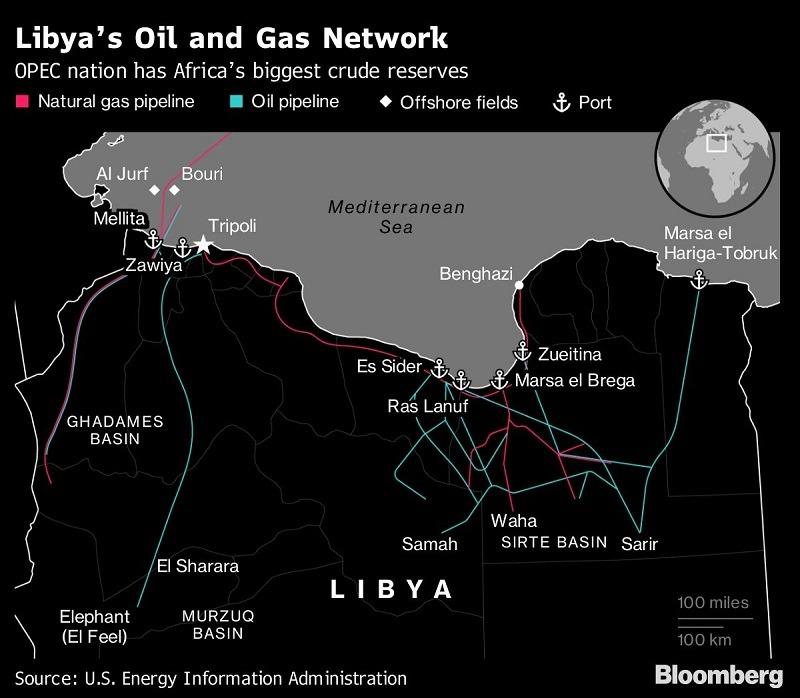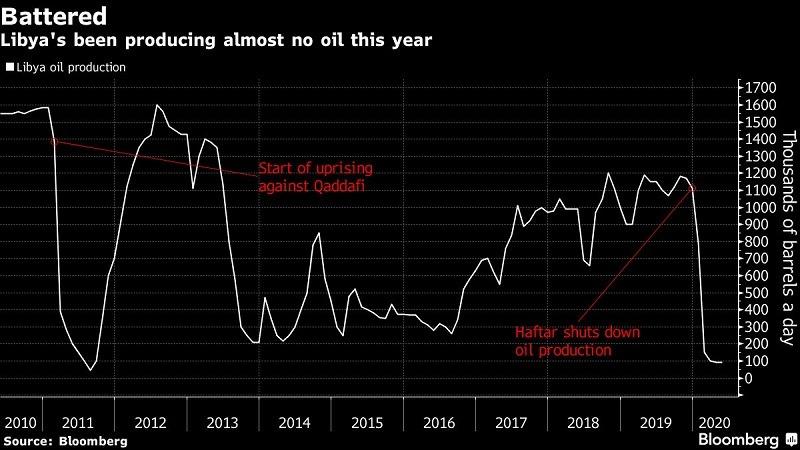 (BLOOMBERG GRAPHIC)
(BLOOMBERG GRAPHIC)
Libya’s battered oil industry suffered another blow as the conflict-ravaged North African country’s biggest field closed less than two days after resuming following a five-month halt.
Work at the Sharara deposit in the southwest has stopped, according to people with knowledge of the matter who asked not to be identified as the information isn’t public. Armed men had entered the field on Monday and told employees to end activities.
The setback threatens a revival of exports from Libya, which has been producing almost no crude since January because of a civil war that led to almost all its ports and fields being blockaded or closed.
ALSO READ: Tripoli suspends Libya talks after Haftar attacks Tripoli port
NOC will start crude oil export operations as soon as possible. We hope that production will be resumed at all Libyan fields in the nearest future
Mustafa Sanalla, Chairman, NOC
The Tripoli-based National Oil Corp. lifted a so-called force majeure on crude exports from Sharara on Sunday, and from the nearby El-Feel deposit a day later. Sharara was to start producing about 30,000 barrels a day, with a full ramp-up - to about ten times that amount - taking three months. Sharara’s halt means workers at El-Feel, which is connected to it, could also stop operations.
“NOC will start crude oil export operations as soon as possible,” NOC chairman Mustafa Sanalla had said in a statement before the shutdown, adding that the Zawiya oil refinery will also start making fuel for domestic use. “We hope that production will be resumed at all Libyan fields in the nearest future.”
Sharara’s restart signaled better times in Libya. The country’s energy industry has been dogged for the best part of a decade by power struggles and fighting since the ouster of dictator Muammar Qaddafi in 2011.
For other oil producers, extra Libyan barrels would be less welcome, coming at a time when OPEC and allied producers are doing everything they can to keep supplies off the global market and boost prices. They agreed on Saturday to extend historic production cuts of almost 10 million barrels a day through July. Libya, with Africa’s largest oil reserves, is exempted from the restrictions due to its strife.
Brent crude was trading 0.6 percent lower at US$40.57 a barrel at 8:45 a.m. in London. It’s down 39 percent this year.
NOC said the first phase at El Feel would see production of 12,000 barrels a day. It would probably take two weeks to return to full capacity of closer to 100,000 barrels a day due to damage caused by the shutdown, the company said.
In mid-January, the NOC declared force majeure for exports of the Sharara grade of crude from Zawiya, a port near Tripoli. That’s a legal status protecting it from liability if it can’t fulfill a contract for reasons beyond its control. The measure was applied to several ports.
 (BLOOMBERG GRAPHIC)
(BLOOMBERG GRAPHIC)
The chaos at the country’s oil facilities came amid a military offensive by Khalifa Haftar, a commander based in eastern Libya, to conquer Tripoli in the west and consolidate his control over the country.
His supporters shut down most crude production in January. Exports plunged from 1.2 million barrels a day to some 90,000. The collapse has cost the oil-dependent nation billions of dollars in lost revenue.
Forces loyal to United Nations-recognized Prime Minister Fayez al-Sarraj have gained ground in the past month, thanks largely to military support from Turkey. They pushed Haftar out of his last stronghold in the west last week.
READ MORE: Foreign powers back Libya ceasefire as oil flows choked
Haftar accepted an Egyptian-sponsored cease-fire on June 8, though Sarraj’s administration said government forces would try the cities of Sirte and Jufra before entering political negotiations to end the war.
Taking Sirte would put them close to the so-called oil crescent, the area containing most of Libya’s oil reserves.
Haftar’s Libyan National Army has so far stymied the forces of al-Sarraj’s Government of National Accord near Sirte.


